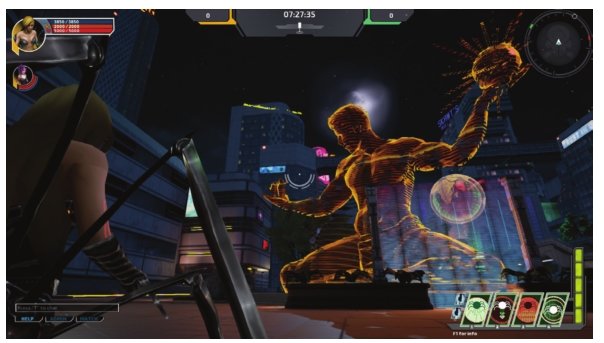
Imagine a soccer game, except that you have to navigate shifting floors and dodge gunfire while trying to knock a spiked skull into the opponent’s goal. That’s the basic idea behind Skull Ball, one of the five game modes featured in “Tuebor.”
The multifaceted computer game was released earlier this month by Lansing's Strength in Numb3rs Studios. Pronounced “tway-bore,” the title, Latin for “I will defend,” is inspired by Michigan’s state seal.
“I was with my daughter over at the Capitol Building, and I had a really bad working title,” said Strength in Numb3rs CEO Scott Reschke. “I saw it etched on one of the windows. I looked it up, and thought it really worked for what I was trying to do.”
“Tuebor” is the first project from the Lansing video game studio, which opened April 2015. Reschke calls the game an “MMO-lite.” MMO, short for Massive Multiplayer Online, refers to games like “World of Warcraft,” where a large number of players — sometimes thousands — play together in the same virtual world. But “Tuebor” also features elements of popular first person shooter games like “Call of Duty.”
“It blurs the lines a little bit,” said Reschke, noting that project is a “blend of a lot of different genres.”
To create the game, Reschke, 41, drew on the experiences of hundreds of gamers.
“I owned the Frag Center, a cyber café in East Lansing, for eight and a half years,” Reschke said. “Over that period we had 600,000 hours of game time.”
The business offered Reschke a direct way to track gamer preferences, which influenced the varied game modes and specialized characters in “Tuebor.” Reschke found that players enjoyed designing and using their own characters but wanted to use them in a variety of different settings. This led to the development of the five different game modes for “Tuebor.”
The game offers 30 diverse, customizable characters for players to explore, each with a unique backstory designed to resonate with a variety of potential gamers. One such character, Manco, is a scorpion/ human hybrid seeking to avenge the death of his husband. The development of characters from all walks of life was driven by Reschke’s desire to create an inclusive environment.
“I am told that this is the first game ever that you can play as a gay hero,” Reschke said. “What does this change? Nothing. You run around and have abilities and have fun. I didn’t want to try and make some goofy, effeminate caricature, so he’s very strong, out for revenge and angry at the world. A typical love story.”
Manco is voiced by local actor and television producer Taylor Kelsaw, who has known Reschke for several years.
“He created a character around me, so it was an honor and a pleasure to be a part of it,” Kelsaw said.
Kelsaw is married to Cristoph Adami, who teaches microbiology, molecular genetics, physics and astronomy at Michigan State University. Adami is working with Arend Hintze, an assistant professor in MSU’s Department Of Integrative Biology, to create the Avida artificial intelligence system that will eventually be implanted in the game.
When perfected, the system will learn and grow from player responses, becoming progressively more difficult to defeat. But that development still needs a lot of work before it can be implemented in the game.
The game was released Sept. 14 for Windows and Mac OS X computers, and players have a month to download and play it free through Steam (store.steampowered.com), a popular online video game store. More information is available at tueborgame.com. The free trial period allows the developers to fix bugs and develop new features based on player feedback.
The studio will eventually monetize the game, but Reschke wanted to steer away from what he calls “pay to win” formats, where players are able to outspend their opponents to gain advantages. Instead, the studio plans to offer “vanity items” to customize characters.
“The way we monetize is by making a game that is so much fun, and purchases help you shape your character,” Reschke said.
Support City Pulse - Donate Today!
Comments
No comments on this item Please log in to comment by clicking here